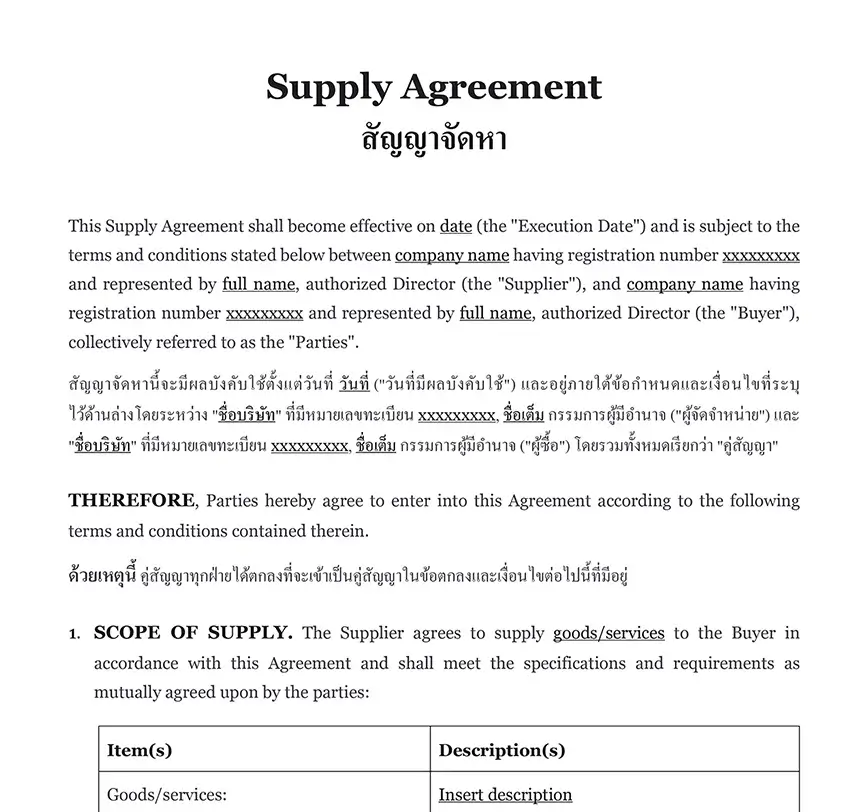Ready to use legal template
Drafted by experienced lawyers
Certified Thai-English translation
Ready to use legal template
Drafted by lawyers
Translated in Thai-English
Home › Business contracts › Supply Agreement
Learn more about Supply Agreement
A Supply Agreement in Thailand is a fundamental document that governs the procurement, distribution, and supply of goods or services between parties. It lays out the terms and conditions under which products are purchased, delivered, and maintained, ensuring smooth and efficient supply chain management. At Themis Partner, we recognize the critical role of well-structured Supply Agreements in fostering successful business relationships. That’s why we offer a user-friendly legal template, meticulously crafted by experienced lawyers to align with Thailand’s legal framework. Our template simplifies the process of drafting a Supply Agreement, making it easy for parties to customize it to their specific needs while ensuring legal compliance.
Table of contents
-
-
What is a Supply Agreement in Thailand?
-
Is a Supply Agreement legally binding in Thailand?
-
What are the common uses of Supply Agreements?
-
Does it work with any kind of Suppliers?
-
What are the differences between Distribution and Supply Agreement?
-
What should be included in a Supply Agreement?
-
What happens in case of disputes or changes?
-
What is a Supply Agreement in Thailand?
A Supply Agreement in Thailand is a legally binding contract that outlines the terms and conditions governing the procurement, distribution, and supply of goods or services between two or more parties. It defines the roles, responsibilities, and obligations of each party, including specifications for product quality, quantity, delivery schedules, pricing, payment terms, and any other relevant terms. This agreement plays a pivotal role in regulating the supply chain and ensuring a smooth flow of goods or services between suppliers and buyers in Thailand.
Is a Supply Agreement legally binding in Thailand?
Yes, a Supply Agreement in Thailand is legally binding, provided that it meets the necessary legal requirements and contains elements that make it enforceable under Thai law. The agreement must include clear and specific terms, demonstrate the intention to create legal relations, involve consideration, comply with Thai legal requirements, and be executed with the consent of competent parties. When properly structured and executed, a Supply Agreement is a legally enforceable contract that governs the supply of goods or services in Thailand.
What are the common uses of Supply Agreements?
Supply Agreements in Thailand serve as vital contractual arrangements that facilitate the procurement and distribution of goods or services in a wide range of industries. These legally binding contracts define the terms and conditions under which parties engage in the supply chain, encompassing aspects such as product quality, quantity, pricing, payment terms, and delivery schedules. They are commonly used in manufacturing, retail, e-commerce, hospitality, healthcare, construction, technology, agriculture, energy, transportation, telecommunications, pharmaceuticals, and more. By providing a structured framework for supply relationships, these agreements help businesses ensure a consistent and reliable flow of resources, reduce risks, and maintain product quality while adhering to Thailand’s legal requirements.
Does it work with any kind of Suppliers?
Supply Agreements in Thailand offer flexibility and adaptability, allowing businesses to engage with a diverse range of suppliers. These agreements can be effectively customized for goods suppliers, service providers, manufacturers, distributors, wholesalers, farmers, technology and equipment suppliers, and more. By tailoring the terms and conditions, businesses can regulate the procurement and distribution of products or services, ensuring consistency, quality, and efficiency within their supply chains. This versatility makes Supply Agreements a versatile and indispensable tool for various industries and procurement scenarios, fostering mutually beneficial supplier relationships while adhering to Thailand’s legal requirements.
What are the differences between Distribution and Supply Agreement?
Distribution and Supply Agreements in Thailand are distinct contracts with different purposes and focuses within the supply chain. A Distribution Agreement primarily concerns the distribution of products or services to end customers through a distributor, emphasizing marketing, sales, and territorial rights. In contrast, a Supply Agreement centers on the procurement and supply of goods or services, detailing product specifications, pricing, and delivery terms directly between a supplier and a purchaser, which could be a distributor, manufacturer, retailer, or end user. These agreements differ in their parties, direction of product flow, inventory ownership, termination provisions, and legal implications, necessitating careful consideration of the specific needs and relationships involved in each scenario.
What should be included in a Supply Agreement?
A comprehensive Supply Agreement in Thailand should encompass several key elements and provisions to ensure clarity, compliance, and the smooth functioning of the supply chain. Here are the essential components that should be included:
1. Parties
Identify and provide contact information for all involved parties.
2. Scope of Supply
Specify the products or services, including detailed descriptions, quantities, and quality standards.
3. Pricing and Payment
Outline pricing, payment terms, and currency details.
4. Delivery Terms
Detail shipping responsibilities, delivery locations, schedules, and Incoterms.
5. Quality Assurance
Describe quality control measures and inspection procedures.
6. Termination
Define conditions and procedures for agreement termination, including notice periods.
7. Dispute Resolution
Specify mechanisms for resolving disputes, such as negotiation, mediation, or arbitration.
8. Governing Law
Indicate the governing law for interpretation and jurisdiction for dispute resolution.
9. Confidentiality
Address confidentiality and non-disclosure obligations for sensitive information.
What happens in case of disputes or changes?
In the event of disputes or required changes within a Supply Agreement in Thailand, the agreement should feature provisions for dispute resolution and amendment procedures. Dispute resolution processes, such as negotiation, mediation, or arbitration, should be clearly defined to facilitate the prompt and amicable resolution of conflicts. Additionally, an established amendment procedure should outline the steps for proposing, reviewing, and implementing changes to the agreement, with written consent from all parties typically required. These provisions ensure that parties have a structured approach to addressing disputes and making necessary adjustments, fostering a collaborative and adaptable supply relationship while minimizing legal conflicts.
Supply Agreement
Drafting
Ask our corporate experts to draw up your own tailor-made contract
Share information
Why Themis Partner?
Easy legal documents at your fingertips
Make trusted documents for hundreds of purposes.
Hundreds of documents
Instant access to our entire library of documents for Thailand.
24/7 legal support
Quick legal advice from our network of qualified lawyers.
Easily customized
Editable Word documents, unlimited revisions and copies.
No translation fees
Certified Thai-English translation included for all documents.
Legal and Reliable
Documents written by lawyers that you can use with confidence.
Free consultation
Free lawyer consultation on each new matter.




